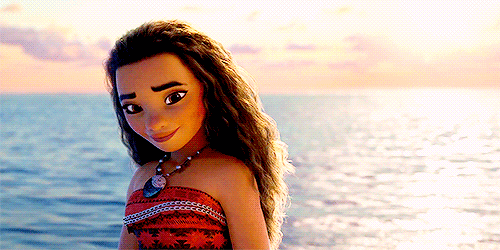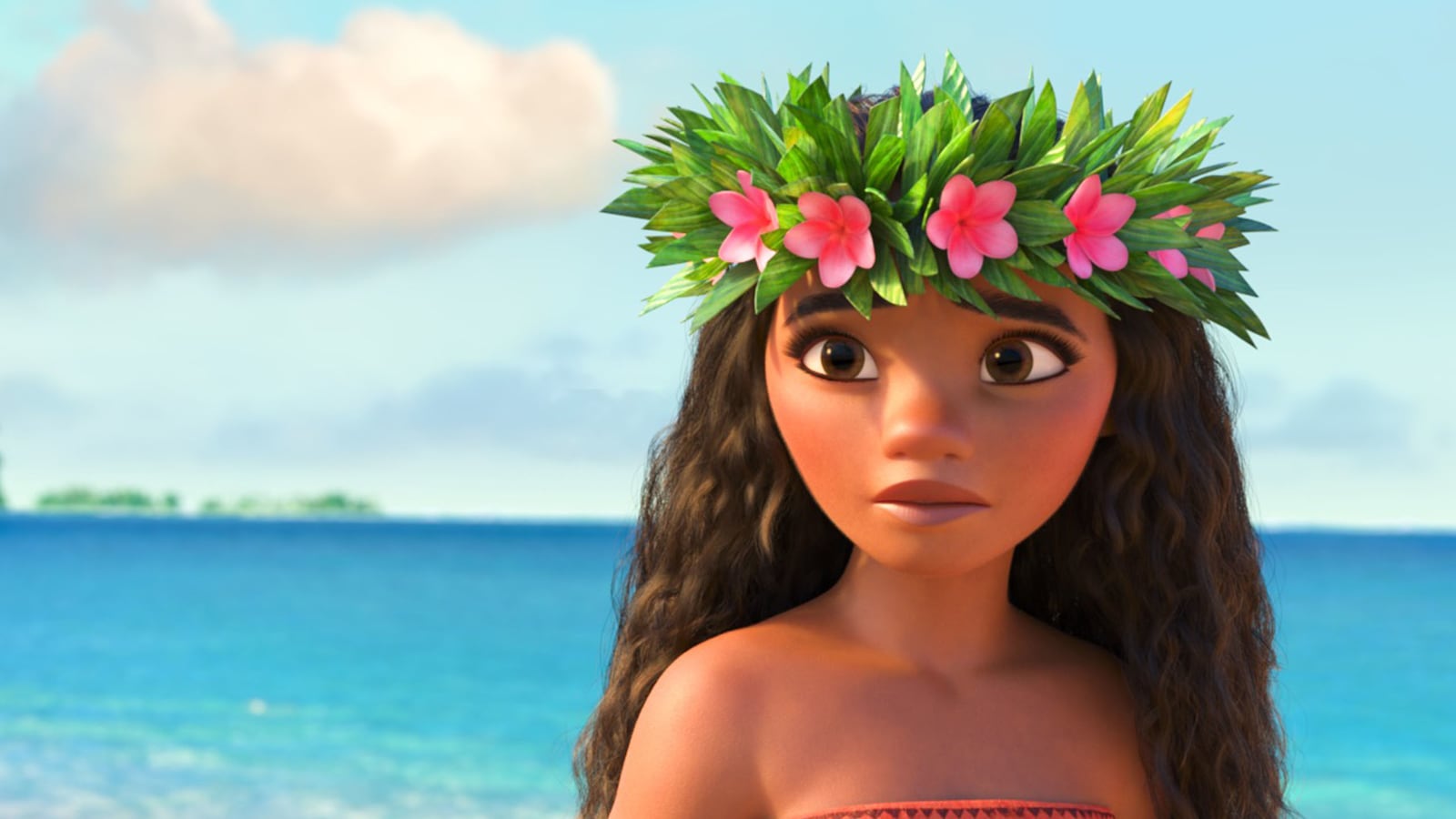In Moana we get the heroine we need for these anxious post-election times, and the Disney Princess we finally deserve. She arrives in the form of a fearless 16-year-old who hates being called a princess and wrangles Dwayne “The Rock” Johnson as her sidekick. And instead of learning to screw the haters and let it all go, Moana Waialiki, a teenage girl born into a long lineage of Polynesian leaders, learns to never accept limits in how far she can go.
The timing of Moana’s Thanksgiving week release certainly would have made for much better poetry had the election swung Hillary Clinton’s way. But as we keep waiting for the day the first woman moves into the Oval Office maybe this powerhouse princess and her new brand of kiddie-targeted feminist strength will raise a generation of young women who’ll see shattering that ultimate glass ceiling as a routine inevitability, instead of a trailblazing first.
So while white nationalists find a foothold in the administration of an admitted pussy-grabbing president-elect, Moana offers a marvelous respite: It’s both a satisfying traditional Disney narrative and the most progressive film in the studio’s 93-year history, one with a fierce, noble, and confident POC at its center: a princess of color.
The film follows Moana (voiced charismatically by 16-year-old Hawaiian discovery Auli’I Cravalho), the daughter of a chief who’s always been told she’ll one day lead her people. Forbidden from venturing into the vast ocean that calls to her, she struggles to contain the yearning to go beyond her world. But when ecological decay starts devastating their only food sources and threatening the future of the island, she defies her father and leaves behind the safety of her home in order to save it from ruin.
To do so Moana sets sail with a brainless pet chicken by her side and the ocean itself as her guide in search of the cocky demigod Maui (Johnson), determined to make him return the stolen life-giving stone whose theft triggered the slow death of her island. Along the way it’s he who proves selfish and scared, a brash superhuman with magical tattoos and a serious need for therapy. Moana, on the other hand, digs deep to find the spunky confidence to take on the most fearsome of enemies: Ships of marauding pirate coconuts, a giant lava monster, and most of all her own self-doubt.
Written by Jared Bush (Zootopia) and buoyed by a stirring soundtrack by Hamilton phenom Lin-Manuel Miranda, Moana is the coming-of-age tale of a young person forging her own way in the world. It’s a Disney princess movie in which there are no princes hanging around, no boys to really think about at all, no girly hang-ups or thingamabobs to fritter over, and no romantic subplots to distract from what’s truly important: survival, independence, identity, self-belief. “How Far I’ll Go,” the anthemic earworm equivalent to Frozen’s “Let It Go,” is rousing and courageous. How far we’ve come from the days of Disney heroines waiting for guys to put a ring on it or show up bearing the right sized shoe.
The beautifully animated adventure is also Disney’s first film about Pacific Islanders, starring Pacific Islanders, from Cravalho and Johnson to Temuera Morrison to Rachel House to Flight of the Conchords’ Jemaine Clement, who steals the spotlight as a blinged-out evil crab with a glam rock solo track. Its script borrows from myths and traditions vetted by a coalition of cultural experts dubbed the Oceanic Story Trust, while Oceanic musician Opetaia Foa’i collaborated with Manuel and composer Mark Mancina on the score.
Directors Ron Clements and John Musker most recently helmed 2009’s The Princess and the Frog, whose heroine Tiana was another first: Disney’s first African-American princess. Over two decades ago the pair also directed Disney renaissance classics The Little Mermaid and Aladdin, elements of which echo throughout Moana. Their vibrant environments and designs, rich in detail, never overshadow Moana’s most tremendous visual achievements—that here, front and center for nearly two hours, are lead characters with tan skin, dark wavy tresses, distinctly non-Caucasian features, and traditional hand-tapped tattoos preserving their histories on their skin.
Of course there have been a few stumbles, which Disney managed to address or evade. When the first images of Johnson’s oversized Maui were released, the studio was criticized for perpetuating a stereotype of Polynesian men as obese. In September, Disney—which has already stocked shelves with an enormous line of Moana merchandise—pulled a children’s Maui costume after it was blasted for being culturally inappropriate.
“The team behind Moana has taken great care to respect the cultures of the Pacific Islands that inspired the film, and we regret that the Maui costume has offended some,” Disney responded in a statement. “We sincerely apologize.”
All of this still measures leagues ahead of how Big Disney’s treated female characters in its lucrative Marvel Cinematic Universe, where women and minority superheroes are still on their way to getting their due as characters granted the confidence to carry their own standalone films. Scarlett Johansson’s Black Widow has perhaps suffered more slights than any other woman in the Marvelverse, used to prop up her male teammates onscreen and left out of merchandising offscreen.

Moana not only makes the Avengers look hopelessly retrograde, it also exceeds the most recent batch of Disney princess tales—a series that has become more and more progressive as it’s abandoned the white damsel tradition of yore for greater agency and diversity. It’s not difficult to envision the intrepid young Moana leading a village or a nation, nor is it ever hard for Moana herself to believe that yes, she can—because everywhere she turns in her idyllic island of Motunui, people are telling her she’s capable.
Her father, Chief Tui Waialiki, is so overprotective he forbids Moana from venturing beyond the safety of their reef. But he also instills in her the self-belief of a leader—which is exactly what prompts her to disobey his orders to set sail in order to save her people, while the teachings of her grandmother Tala (House) give her spiritual direction rooted in her heritage.
Disney’s 2013 megahit Frozen subverted the romantic expectations of the traditional fairytale with its twist ending: Instead of the true love’s kiss from a would-be Prince Charming who, it turned out, was just in it for the power grab, it was the sisterly bond between Elsa and Anna that saved the day. (Priorities, ladies.) Hans’s duplicity and its plot-driving aftermath was a welcome departure from the marriage-obsessed Cinderellas and Sleeping Beauties and Snow Whites of Disney eras past. But Frozen also had strapping young Kristoff to balance out all the power estrogen—as if two women in charge would otherwise be one too many.
And that is precisely what makes Moana more the heroine’s tale we need—arguably more than the Frozens, or Tangleds, or The Princesses and the Frogs. Even Mulan, Disney’s only Asian princess, had to disguise herself as a dude to skirt serious self-image issues and blatant sexism. Moana, at last, is allowed to simply be. Raised from birth to inherit the chieftainship, she is reminded constantly that she is capable and strong and given such confidence to lead the men and women around her from an early age that her ability to do so is never in question.
In that way she’s more like Merida, the flame-haired Disney-Pixar princess of Brave, who literally ran away from the concept of compulsive marriage as a necessary part of her royal destiny. Moana doesn’t need the love of a boy to complete her or her journey—but unlike Merida, she never has to worry about it either, since no one ever bothers bringing it up, least of all the film’s screenwriter.
She also never wants to flee her duty to her people, whose traditions she holds in reverence. Her love for them sends her sailing headlong into the open seas. If there are even any cute boys—or girls—in the village she might one day consider taking as a partner, we don’t meet them. We don’t need to. Moana is enough of a heroine to fill her own story, and that’s a crucial takeaway that Disney and other studios have taken far too long to embrace.






